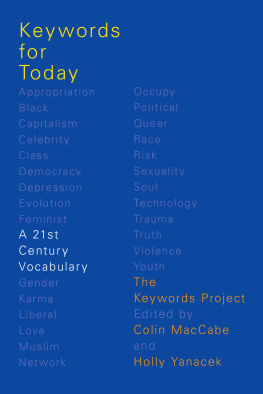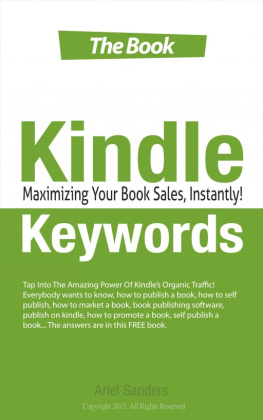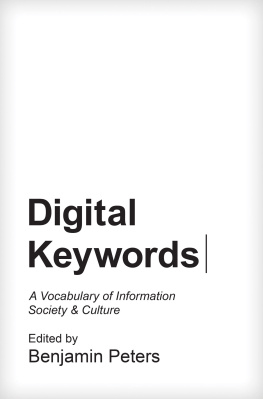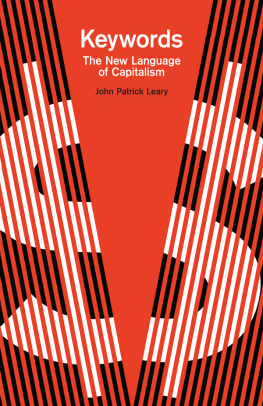The Keywords Project The Keywords - Keywords for Today
Here you can read online The Keywords Project The Keywords - Keywords for Today full text of the book (entire story) in english for free. Download pdf and epub, get meaning, cover and reviews about this ebook. year: 2018, publisher: Oxford University Press, Incorporated, genre: Religion. Description of the work, (preface) as well as reviews are available. Best literature library LitArk.com created for fans of good reading and offers a wide selection of genres:
Romance novel
Science fiction
Adventure
Detective
Science
History
Home and family
Prose
Art
Politics
Computer
Non-fiction
Religion
Business
Children
Humor
Choose a favorite category and find really read worthwhile books. Enjoy immersion in the world of imagination, feel the emotions of the characters or learn something new for yourself, make an fascinating discovery.
- Book:Keywords for Today
- Author:
- Publisher:Oxford University Press, Incorporated
- Genre:
- Year:2018
- Rating:5 / 5
- Favourites:Add to favourites
- Your mark:
- 100
- 1
- 2
- 3
- 4
- 5
Keywords for Today: summary, description and annotation
We offer to read an annotation, description, summary or preface (depends on what the author of the book "Keywords for Today" wrote himself). If you haven't found the necessary information about the book — write in the comments, we will try to find it.
Keywords for Today — read online for free the complete book (whole text) full work
Below is the text of the book, divided by pages. System saving the place of the last page read, allows you to conveniently read the book "Keywords for Today" online for free, without having to search again every time where you left off. Put a bookmark, and you can go to the page where you finished reading at any time.
Font size:
Interval:
Bookmark:


Oxford University Press is a department of the University of Oxford. It furthers the Universitys objective of excellence in research, scholarship, and education by publishing worldwide. Oxford is a registered trade mark of Oxford University Press in the UK and certain other countries.
Published in the United States of America by Oxford University Press
198 Madison Avenue, New York, NY 10016, United States of America.
Oxford University Press 2018
All rights reserved. No part of this publication may be reproduced, stored in a retrieval system, or transmitted, in any form or by any means, without the prior permission in writing of Oxford University Press, or as expressly permitted by law, by license, or under terms agreed with the appropriate reproduction rights organization. Inquiries concerning reproduction outside the scope of the above should be sent to the Rights Department, Oxford University Press, at the address above.
You must not circulate this work in any other form and you must impose this same condition on any acquirer.
Library of Congress Cataloging-in-Publication Data
Names: MacCabe, Colin, editor. | Yanacek, Holly editor.
Title: Keywords for today : a 21st century vocabulary : the keywords project /
edited by Colin MacCabe and Holly Yanacek.Description: New York, NY : Oxford University Press, 2018. |
Includes bibliographical references and index.
Identifiers: LCCN 2018013234 (print) | LCCN 2018030170 (ebook) |ISBN 9780190636586 (updf) | ISBN 9780190636593 (epub) |
ISBN 9780190636579 (pbk. : alk. paper)
Subjects: LCSH: English language21st centuryGlossaries, vocabularies, etc.
|English languageEtymology.
Classification: LCC PE1680 (ebook) | LCC PE1680.K47 2018 (print) |
DDC 428.1dc23
LC record available at https://lccn.loc.gov/2018013234
The Keywords Project is a radically collaborative, cross-institutional, and cross-disciplinary research initiative sponsored by the University of Pittsburgh, Jesus College Cambridge, and the academic journal Critical Quarterly. Over the past decade, the members of the Keywords Project have worked to update Raymond Williamss classic Keywords for the 21st century and new generations of readers.
As the Keywords Project concludes, the membership list includes some who have left the Project and others who joined while work was already underway, but all have contributed to the substance of this volume and of the website (http://keywords.pitt.edu/):
Sylvia Adamson, Emeritus Professor of Linguistics and Literary History, School of English, University of Sheffield
Kathryn Allan, Senior Lecturer in the History of English, University College London
Susan Z. Andrade, Associate Professor of English, University of Pittsburgh
Jonathan Arac, Director of the Humanities Center at the University of Pittsburgh
Jennifer Davis, Faculty of Law and Fellow of Wolfson College, University of Cambridge
Alan Durant, Professor of Communication in the School of Law, Middlesex University, London
Philip Durkin, Deputy Chief Editor of the Oxford English Dictionary
Matthew Eagleton-Pierce, Senior Lecturer in International Political Economy, SOAS University of London
Stephen Heath, Fellow of Jesus College, Cambridge, and Keeper of the Old Library
Colin MacCabe, Distinguished Professor of English and Film, University of Pittsburgh
Seth Mehl, Research Associate, School of English, University of Sheffield
Arjuna Parakrama, Senior Professor of English, University of Peradeniya, Sri Lanka
Kellie Robertson, Associate Professor of English, University of Maryland
Holly Yanacek, Assistant Professor of German, James Madison University
In addition to these fourteen members of the Keywords Project, Keywords for Today brought together over twenty participants in University of Pittsburgh graduate seminars. More information about the seminar directed by Jonathan Arac and Colin MacCabe may be found in Critical Quarterly (2016), along with a sample of the students work; some others appear as part of this volume, and yet others appear on the website. These are the students and the words they worked on: Samuel Allen, Public; Amanda Awanjo, Trans; Sagnika Chanda, Man; Evan Chen, Gentrification; Max Ginsberg, Authority; Joshua Graber, Social; Sylvia Grove, Artificial; Treviene Harris, Privilege; Kaitlyn Haynal, Access; Adam Hebert, Occupy; Artan Hoxha, Fundamental; Nicholas Marsellas, Respect; Sarah Mejia, Digital; Alexandra Ouyang, Security; Lauren Posey, Gender; Sarah Schaefer, Love; Tetyana Shlikar, Network; Leonardo Solano, Diaspora; Nicholas Stefanski, Future; Marina Tyquiengco, Appropriation.
Key is a very old word in English with the simple sense of an instrument designed to be inserted into a lock and turned. Over time it has developed a whole range of figurative uses, and in its sense of a solution or explanation for a problem it undoubtedly informed Raymond Williamss choice of the term keywords to name the set of words for which he began to write glosses in the 1950s. These keywords helped to solve both a very particular and a very general problem with which he was wrestling in that decade. The particular problem was the meaning of culture. In 1948 T. S. Eliot had published Notes towards the Definition of Culture. Eliot was widely considered both as the greatest of living poets and the most important of literary critics, but his message was unambiguously conservative. If you valued culture, then you had to abandon the desire for a classless society, because culture could only be produced by a class-stratified society. As a socialist, Williams had struggled against these arguments, and he found his solution, almost by chance, in the Oxford English Dictionary: the dictionarys history of this complex word culture allowed him both to place Eliots argument within a development and also to find in that development alternative arguments, which linked the fullest form of culture to the fullest growth of democracy in a classless society. Eliots definition of culture effectively restricted it to the arts, but the dictionary revealed that this sense of the word dated back no further than the late nineteenth century. Earlier meanings of the word stretched back a further century, and they focused on a general process of intellectual, spiritual, and aesthetic development. Those earlier senses led Williams to his own formulation of culture as a whole way of life. By this means he could value the solidarity that he understood to be the great cultural value of the working class into which he had been born, while he could also value those artistic productions to which Eliot had limited the sense of the word.
The OED not only provided a very specific answer to the particular problem of culture, it also provided the best evidence for the very slow and complicated process of social change which Williams was trying to understand in the 1950s. This had a deeply personal level, explored in his semi-autobiographical novel Border Country, but it was also a pressing political problem for anyone who agreed with Marxs analysis of the centrality of class struggle but who rejected Lenins call for violent and sudden revolution. As Williams tracked his
Font size:
Interval:
Bookmark:
Similar books «Keywords for Today»
Look at similar books to Keywords for Today. We have selected literature similar in name and meaning in the hope of providing readers with more options to find new, interesting, not yet read works.
Discussion, reviews of the book Keywords for Today and just readers' own opinions. Leave your comments, write what you think about the work, its meaning or the main characters. Specify what exactly you liked and what you didn't like, and why you think so.





